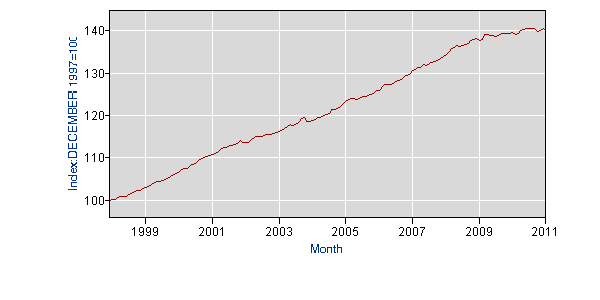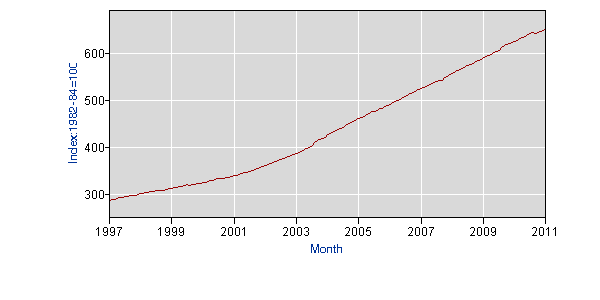February 19, 2011
David Leonhardt is one of the country’s more thoughtful economic columnists who often has insightful pieces in his columns at the NYT. This makes his interview with two economists who recently wrote a book on college costs even more disturbing. He doesn’t ask the tough questions.
His interviewees argue that one of the main reasons that college tuition has risen so much more rapidly than other prices is that college provides a service and that productivity growth in services is less rapid than productivity growth in goods production. They explicitly note that a college education is like haircuts in this respect.
The data don’t support this case. Below we have graphs for the price increases in haircuts and college tuition since 1997 (as far back as BLS has data for haircuts). The price of haircuts increased by 40 percent over this period, while the price of college tuition increased more than 120 percent. Clearly the service story does not get us very far.
Price of Haircuts — 1997 = 100

Source: BLS
College Tuition

If the fact that a college education is a service does not explain its high price then what does? Well, part of the answer is touched on in the discussion: “they don’t face competition from low-wage countries like China.”
This is true, but that is not an accident, this is by design. Trade agreements like NAFTA were explicitly designed to put U.S. manufacturing workers in direct competition with low-paid workers in the developing world. Business executives from companies like General Electric were brought in on the design of the treaty. They were asked what were the obstacles that prevented them from setting up operations in Mexico. The treaty was then constructed in a way to remove these obstacles.
The United States has not adopted the same route with universities (nor hospitals and law firms). Trade negotiators do not invite university presidents to meetings where they explain all the obstacles that prevent them from taking more advantage of the vast potential pool of high quality faculty from the developing world. (The word “potential” is important. The pool would be much larger if university students in places like India and China knew that it would be as easy for them as native born Americans to get jobs as university professors in the United States.) Given the huge gap in living standards, university professors in developing countries would be willing to work for much lower pay than university professors in the United States, just as auto workers in developing countries work for much lower pay than auto workers in the United States.
In short, one important reason that the cost of a college education rises so much more rapidly than other prices is that university professors are largely protected from foreign competition as a matter of conscious policy, unlike most other workers in the economy. Of course this is not the only reason.
It is now common for university administrators to get high 6-figure and even 7-figure salaries. This is partly as a result of the fact they are following the bloat in private sector pay for top executives. In this sense the process through which top executives now run companies in large part for their interests has affected the pay structure at colleges and universities.
There is also the issue that much of the responsibility of college presidents now is squeezing money from the small group of incredibly wealthy people who make large donations to colleges. This is likely best done by someone who is at least marginally in their ranks rather than someone who works for a living. In this sense, the explosion of inequality in the last three decades has fundamentally altered the role of a university president so that it now primarily involves the ability to cater to the ultra-rich.
[Addendum: Several comments claim that there are no restrictions on the hiring of foreign born professors based on the fact that a substantial number of faculty actually are foreign born. This is known as the “Mexican avocado theory of international trade.” Under this theory, because it is possible to go the supermarket and find avocados grown in Mexico, we have free trade in agricultural products.
Of course we are very far from having free trade in agricultural products. There are a whole array of tariff and non-tariff barriers that it make it difficult to import items grown in other countries. In the same vein, we do have many outstanding academics in the United States who were born in foreign countries. These academics were able to overcome the hurdles that make it difficult (not impossible) for foreign born academics to work in the United States.
It is not legal, for example, for a university to hire dozens or even hundreds of non-citizens/non-green card holders explicitly because they are willing to work for a lower wage than their U.S. born counterparts. This restriction limits the extent to which foreign born faculty will put downward pressure on the wages of U.S. faculty. This doesn’t mean that there is zero competition, just that the competition is deliberately limited by protectionist barriers imposed by the government.]
[Second Addendum: I see that my blogpost brought a response from David Feldman, one of the co-authors of the book that was the basis of Leonhardt’s interview. He may have missed the addendum added above clarifying the nature of international competition that does occur in academia. The point here should be simple.
This is not a zero/one proposition. There is clearly competition. However, it is also a clear violation of the law for a university or college to dump its faculty and replace them with highly English speakers from India or elsewhere who would be willing to work for 40 percent less. If universities had this option, and offered tuition that was $15k-$20k a year less than their competitors would it affect the market? David Feldman says no, I think it likely would, but to argue that precluding this option is not protectionism is just silly.]







Comments